
The Corona Virus lockdown affected almost every country on earth. The lockdown was also applicable to several states and international road borders in Nigeria including Lagos and Ogun States which are international border States. The same is applicable to other states on the Eastern, Western and Northern borders of the country.
I set out on this journey just to see what international travels on road borders within Nigeria is like during the Covid-19 Lockdown, visiting two international border towns closest to me in Lagos, Nigeria.
Nigeria is located on the coast of West Africa. It is bordered by the Blight of Benin and the Gulf of Guinea in south.
On land, it’s bordered by Benin, Cameroon, Chad, and Niger. It also shares maritime borders with Equatorial Guinea, Ghana, and São Tomé and Príncipe.
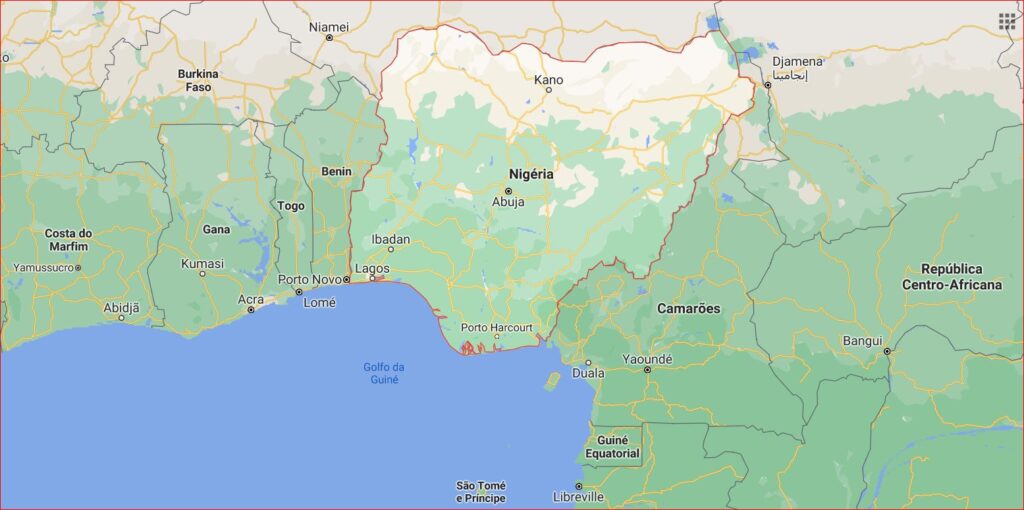
Of all these neighbors, São Tomé and Príncipe and Equatorial Guinea require visas from Nigerian travelers. Other neighbors would only require traveling with an international passport. It is also possible to get boats and ships to some of these countries especially Equatorial Guinea from Calabar.
According to statistics, there are 84 different international border posts in Nigeria and another over 1400 illegal land border crossing points located on the approximately 5000KM of land border in Nigeria.
I chose to visit the Nigeria/Benin border in Lagos and Ogun States because of their proximity to me. I wanted to see things firsthand, even though I was told that there was movement, I wanted to see what it was like and what travelers experience when crossing through the bush paths.
It’s also believed there are more than 80 different illegal borders crossing located in just Ogun State from which human beings, goods and services, etc. make their entry and exit into Nigeria.
At the beginning of this journey, I had to visit the first border town which is located at Idiroko in Ogun State. We would eventually continue from here to Seme, the second border town for this trip which is located in Lagos State.
In Ogun State, we drove to the Nigeria/Benin Republic border located at the Idiroko Nigeria and Igolo on the Benin side. It was a sunny Saturday afternoon and the whole state was on lockdown due to the Corona Virus Pandemic.
Most businesses were closed and there were not much vehicles on the road as one would see on a normal day when going on that border except a few who were providing essential services to the public.
A few other commercial transport operators had to bribe their way to circumvent several law enforcement agents who were stationed on the route to ensure a total compliance to the lockdown order by the government.
There were a few deserted police, Immigration and Customs checkpoints. On a closer approach to the border, there were lots of them.
We attempted to film our experience on the road. The driver of the vehicle however advised that the police and other border officials on the road would destroy our camera if they notice we were filming them. For this reason, we had to film with just the mobile telephone camera.
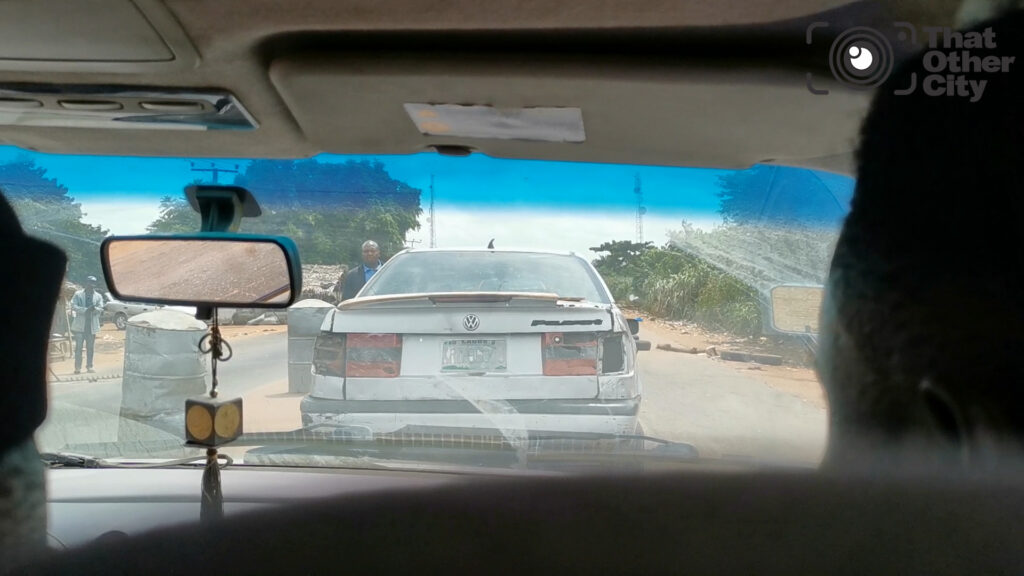
We were able to film a little of our interaction with the police and the customs. We could capture one of the customs officer asking the driver of the vehicle to give him some money. The driver told him he would try to see if he can get any goods on his return trip and if he succeeds, he would be able to pay them some money. This type of conversation among drivers and law enforcement agents at the border route is very common. They all work hand in hand to perpetuate the smuggling of goods into Nigeria through the border.
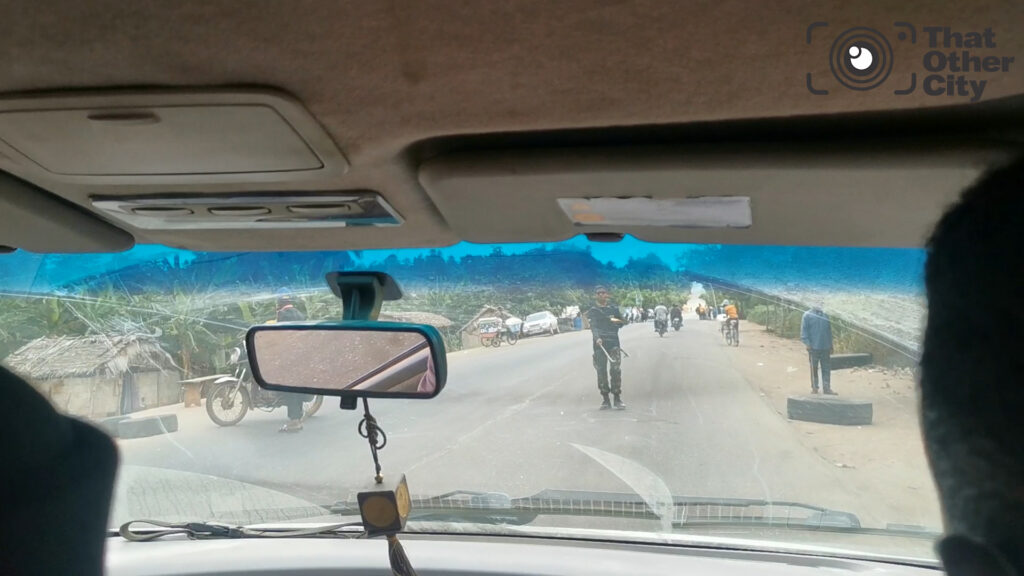
We continued the long journey on this route. It was not busy as usual. Due to its strategic location, a lot of illegal trades and smuggling happens here on a daily basis as noted earlier.
Illegal cross-border trade is carried out by settlers and transient populations using knowledge of the locality and connivance with corrupt law enforcement agents bypass and also locate alternative routes within these border towns.
Goods smuggled include petrol, rice, poultry, tyres, automobile parts, drugs, cars, used shoes, bags, cloths etc.
This route is also famous for its usage by human traffickers to transport young girls and boys from Benin into Nigeria. These often underage children are leased by their parents to work in Lagos for money. Most of these children are taken from Benin and end up as domestic staff in Nigerian households. Others are involved in menial jobs like riding commercial motorbikes, sewing, petty trading etc. This of course, happens on virtually all land borders in Nigeria where lots of people believing Nigeria is a rich country flock in to the country in their thousands to find a better livelihood.
The illegal trade on these land borders has taken a different turn in recent times. The Nigerian Government decided over a year ago to close its land border to the import/export of goods.
The Buhari led government accused neighboring countries and businessmen of taking advantage of the porousness of the borders to export petroleum products and import rice and other poultry produce.
The government claims these activities are not good for the Nigerian economy. This policy however is a threat to the ECOWAS chatter which allows for the free movement of goods and services within the ECOWAS member states.
The resultant effect of this policy was the collapse of several businesses in Nigeria and Benin that thrives on this border. Even companies in nearby Ghana who claimed they have lost millions of dollars due to this closure. They cannot send in their goods to Nigeria from Ghana and vice versa because they have so many goods stranded at the Nigerian border.
Ghana in turn has retaliated by closing down several Nigerian owned retail businesses in their country except for those who have capital exceeding One Million Dollars.
The Nigerian government however claims the Nigerian Customs has noticed a significant increase in their revenue generation since the implementation of the border closure to goods and services. Nigeria has also initiated moves to address this face off with Ghana. The big question is, who will pay for the millions of dollars that the Ghanaian companies lost to the shutdown of the Nigerian borders?
On this journey, we were stopped by several police and immigration officers. In one case, one of the officers assumed I was a foreigner trying to escape the Covid-19 lockdown to my country. He stepped me down from the vehicle and delayed me for more than 5 minutes hoping I would bribe him. He even threatened to send me back to where I was coming from. Fortunately, I convinced him I was not a foreigner and I was allowed to go.
At one of the police stops, we learnt from one of the officers that the annual Oro festival was happening at the Idiroko town and this festival forbids women from coming outside or seen in public on the days of the festival. He made this remark because of one of the female passengers they noticed on our vehicle.
Even though she was visibly scared that she might be attacked by the faithful traditionalists observing this festival, she sounded so confident that she would be safe.
The Oro Festival is an annual event which happens in August. It is a local festival in Idi-Iroko of Ogun State and several other towns in Yoruba land and beyond. The festival dates back to the ancient times and it is meant to proclaim peace on the community. It is also a time of making sacrifices to drive away evil in the land.
On arrival to the Idiroko border, i decided to speak to a few persons about the festival and its significance to the people. They politely declined, advising us to visit the palace of the traditional ruler also known as the Kabiyesi who alone is authorized to disclose this information to us.
We visited the palace but unfortunately, the Kabiyesi was not on seat to provide answers to our curiosity. We however discussed the festival with a few persons around the palace who choose to be anonymous. In Summary,
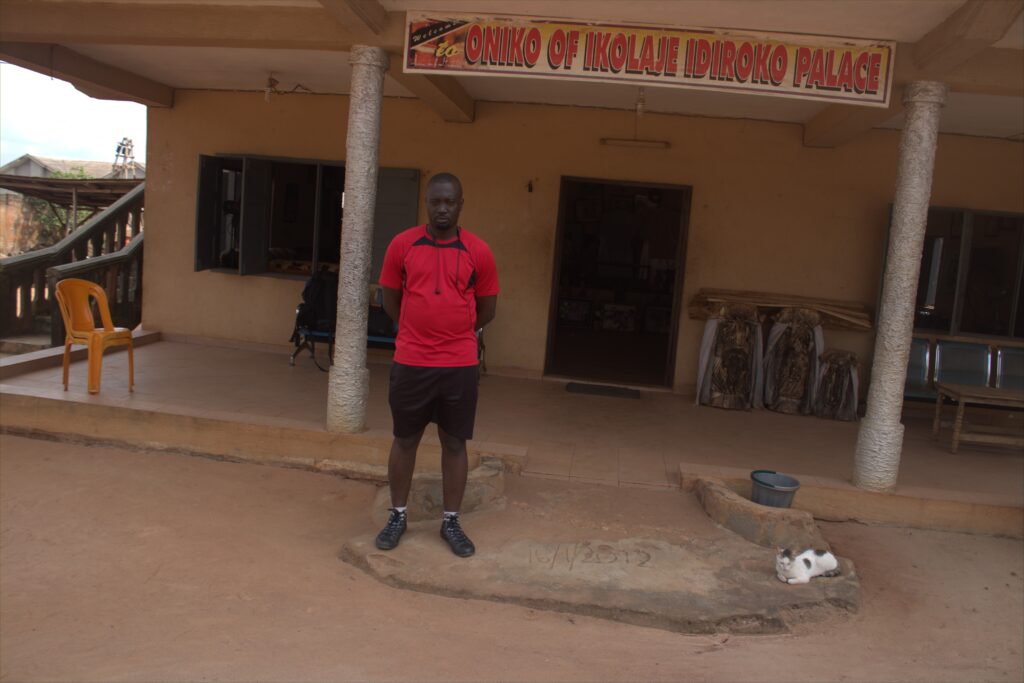
- This festival here in Idiroko holds on 3 consecutive Saturdays in August every year. In some parts of Yoruba land, the festival holds in 3 consecutive days or even 17 days
- The sole purpose of the festival is to purify the villages and drive out evil from the land
- Women are banned from coming outside during this period. In the ancient times, it is believed that if a woman gets missing as a result of being seen outside, she will never be found again but if a domestic animal gets missing, it could be found. In the modern times however, the reverse is the case
- It is also believed that once an indigenous woman is found outside, she would be taken but she might be spared but if she is a visitor, she would be gone forever
- The Oro festival happens in many parts of Yoruba land and many other non-Yoruba cultures
- The government of Nigeria had attempted to put an end to the imposition of curfew on women during the festival due to the fact that it obstructs free movement during the festival and making movement difficult for travelers and business at the border. The guardians of this tradition still keep to it, violating the government’s directive. There also has been massive arrests of the adherents of this religion during the event
- There has been an age long issue with the adherents of this religion and other religions like Christians and Muslims who think the celebration of the festival should not be used to intimidate the women
- The event of this year was suspended by the state government and the Kabiyesi due to the outbreak of Covid-19, yet the traditionalists went ahead with the celebration. Which I assumed was the reason why the people we talked to earlier refused to grant us audience.
On arrival at this border post, some local motorbike operators who transport passengers across the border illegally, approached us in their tens when they sighted our approach to the border.
Crossing the border is very possible. The motorbikes would charge 1000 per person or 1500 for two people if you negotiate very well.
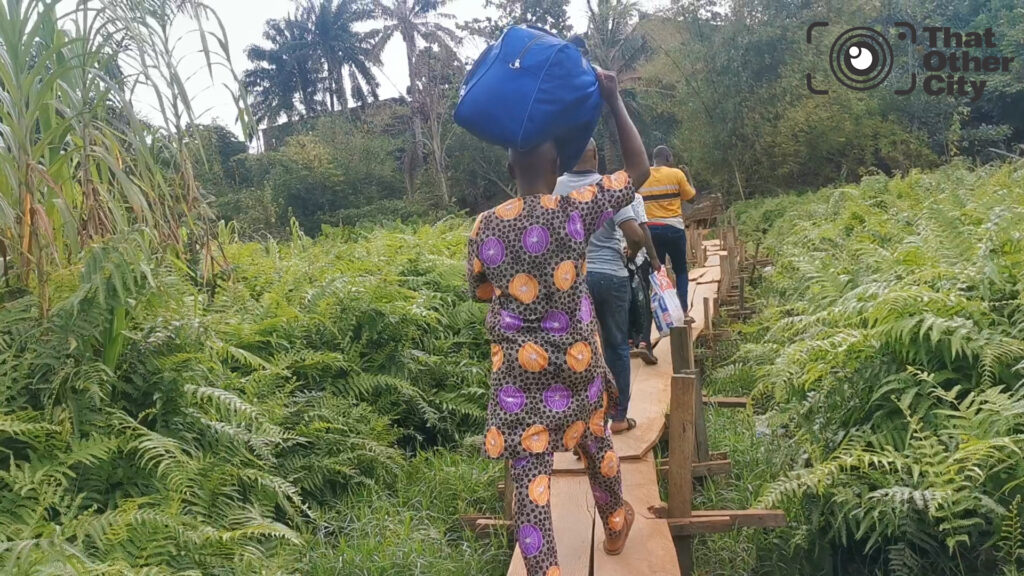
Being determined to have an experience of what this illegal border crossing looks like, we decided to engage one of the old men we met at the border post to show us this route.
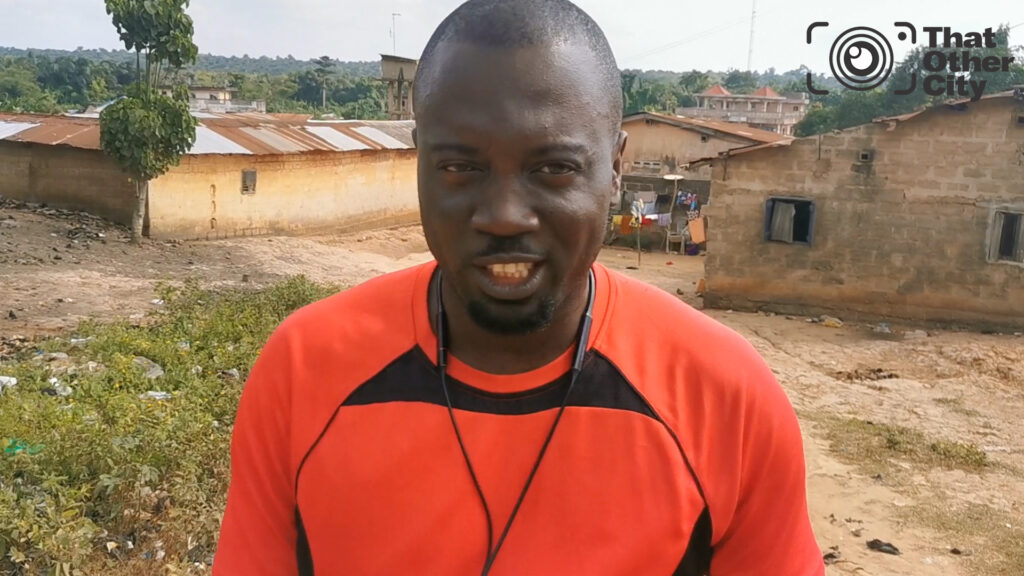
After this tour, which lasted for almost 30 minutes, we left for Badagry through the Izigi route on a motorbike.
We spent almost an hour on a bike who requested for 1500 Naira for two persons. On arrival, we were able to get a boat to Badagry which costed only 200 Naira per person.
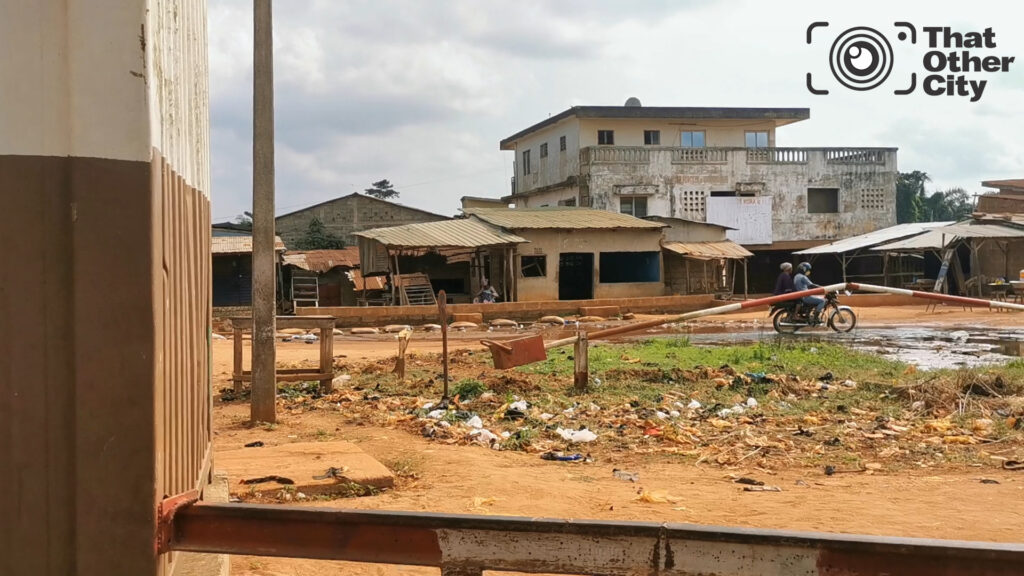
This is one of the shortest ways to link up with Badagry from where we would continue to the next international border town in Seme.
There are other alternative routes but it will require one to go to Owode in Ogun State and then continue from there to Badagry. The other alternative which is shorter is to cross the border and then travel to Benin Republic to Cotonou and then get a vehicle back to Seme. In fact, you need not get to Cotonou, you might as well stop at Seme junction after Porto Novo and then get a bike or car to the Seme border.
The road to Seme from Badagry was replete with men on uniform. They did their job and some of them extorted money from commercial transport operators and a few people on voyage.
Just like Idiroko, our arrival was greeted by swarms of these motorbike operators that transport people across the border illegally. We were told that it would cost us 2500 Naira per person to cross over to Benin Republic. We were not that adventurous to attempt a cross or to see what the remainder of the journey looked like since it was almost 7pm in the evening.
We went back to Badagry to continue the tour the next day.
Crossing other international borders in Nigeria during the Covid-19 pandemic was almost the same experience, except for the Oron Port which I confirmed was open during the pandemic. Boats here operate to different places within Nigeria and outside Nigeria. I was even told that Immigration and other border officials were working all through the period.
Presently, lots of countries are gradually opening up their international borders to airplanes. The land borders for so many other countries are still locked, but we hope they will open up soon.
There is need for countries to open up safely and also ensure that the best safety precautions are put in place to ensure the Covid-19 Pandemic is contained.

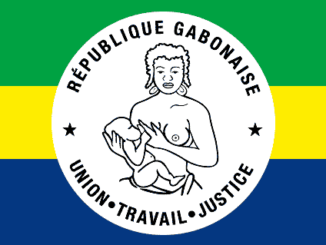


Very interesting your report about border crossing in times of COVID. Your description is really comprehensive as if one were there himself. Thanks for sharing your experiences and facts.